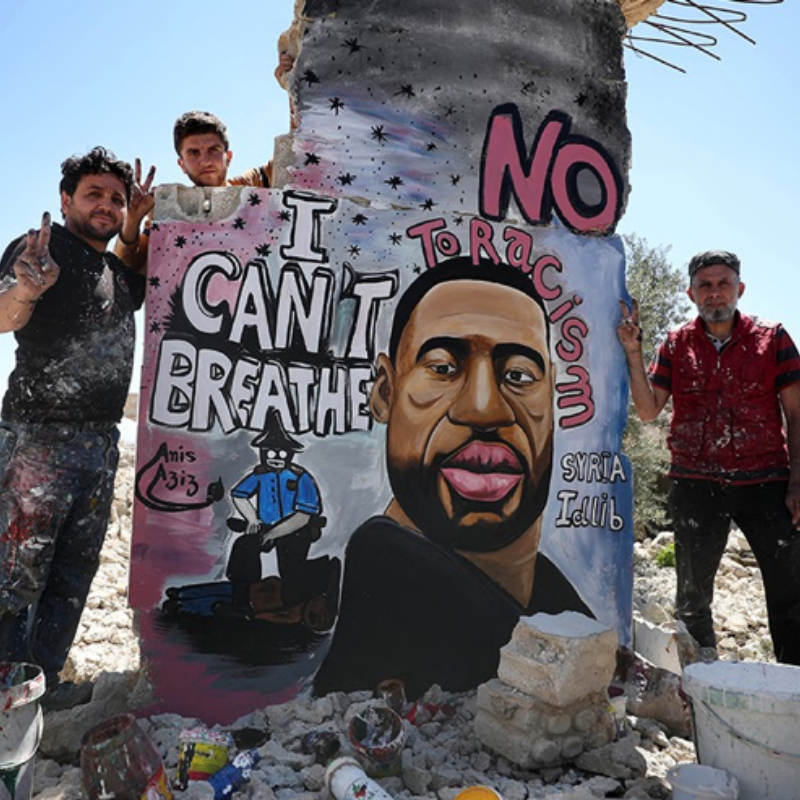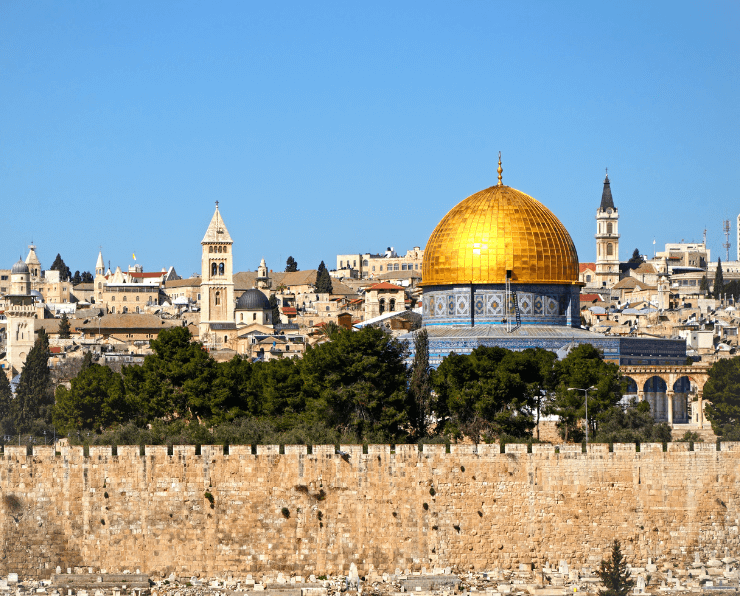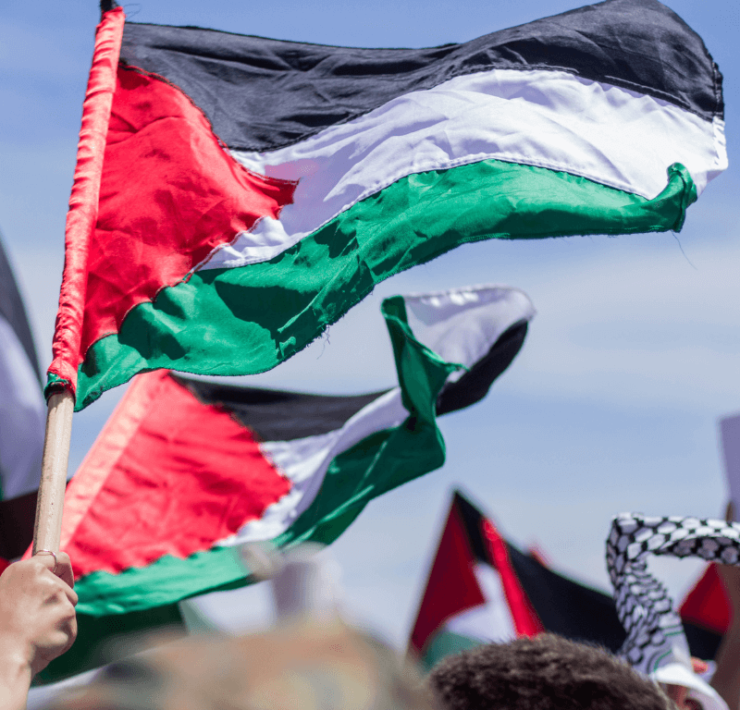I have been disheartened to see a lack of support for Palestine during Israel’s most recent round of attacks. Over the last two months, I have been contemplating why so many people who have vocally supported Black Lives Matter and other progressive political causes have been quiet when it comes to Palestine. I think there are a lot of reasons for this, some of which I will attempt to explain throughout this article.
As someone who has studied and travelled in the MENA region for nearly 20 years, I feel a responsibility to share what I have learned and to positively impact perceptions of the region. It is no secret that Arabs, Muslims, and the MENA region in general have been maligned in the media and that the perpetuation of harmful stereotypes has serious real-world consequences. There is an ever-growing awareness of this same phenomenon in the U.S. as it pertains to Black Americans, and my hope is that this awakening will also extend to the Middle East.
Denial, whether intentional or not, seems to be at the root of our limitations here. As Gabor Mate says, “You can get all the information you want, so if anybody these days doesn’t know, it’s not because the information is not available. It’s not what you know, it’s what you could know if you wanted to find out.” I am asking you to be willing to find out.
Israel continues to perpetuate horrific crimes against humanity, including ethnic cleansing, persecution, and apartheid. This has been happening for nearly a century. Hundreds of thousands of Palestinians have been ethnically cleansed by the state of Israel and over 4.7 million Palestinians live under occupation today. Defenders of these crimes against humanity would like you to think that it’s complicated and are quick to conflate criticism with anti-Semitism. The truth is in fact not that complicated, but has been convoluted with layers of propaganda, fear, trauma, and downright bullying.
The intention of this article is to get underneath some of those layers of obfuscation and to point out parallels between racial oppression in the United States and in Palestine. I hope by the end of this article that you will feel just as empowered to defend the human rights of Palestinians as you may have for Black Americans.

How Othering Works
Othering is the first step toward dehumanizing groups of people in order to legitimize oppressing them. Racist and reductive representations of entire groups of people have been perpetuated for centuries to justify things like imperialism, colonialism, slavery, and genocide. Dr. Ibram X Kendi explains how racist ideas function in his book, How to Be an Antiracist, “The history of racist ideas is the history of powerful policy-makers erecting racist policies out of self-interest, then producing racist ideas to defend and rationalize the inequitable effects of their policies, while everyday people consume those racist ideas, which in turn sparks ignorance and hate.”
Throughout history, racist ideas have been manufactured to legitimize plays for power and wealth. Some of the labels used to achieve this aim include: beasts, barbarians, brutes, savages, backwards, uncivilized, subhuman, terrorists, fanatics, dangerous, and criminals. These stereotypes are meant to dehumanize entire groups of people, rendering them inferior, scary, and even disposable.
Edward Said used the term “Imaginative geography” in his book, Orientalism to convey an understanding about a region based entirely on bias rather than fact. Through the orientalist lens, the Middle East was uncivilized, backwards, primitive, violent, and indolent. In order to capitalize on colonizer dreams, it is necessary to first create a hierarchy and position the other as the scapegoat at the bottom. In constructing itself as superior, the dominating force or power will often seek to justify its actions as somehow necessary or beneficial to the “other,” meanwhile evading interrogation and accountability.
The result of these constructs is a domination of one culture over the other (power over) and an intentional perpetuation of racist ideas. Hence, the cycle begins: racist ideas are consumed, this sparks ignorance, fear, cowardice, and immobility, more racist ideas are consumed to reinforce biases and a need to feel safe and in control, racist ideas become further ingrained and indoctrinated until they become culture. Rinse and repeat.
How Propaganda Works
Once racist ideas become culture, propaganda is used to perpetuate them. Propaganda appeals to raw emotions by fabricating fear and bypassing critical thinking. Propaganda runs deep in both American and Israeli societies. For example, in school, we are taught a glossed over, white/euro-centric version of history that erases the experiences of Native Americans, Black Americans, Palestinians, and other minority groups. Most of us never question this as our true history and in fact, many of us develop a deep sense of pride and patriotism over how awesome our country is. To say that this is deeply traumatizing (and violent) to minority groups is a gross understatement.
Mira Stern reflects on how propaganda functions in Jewish communities, “Like most Ashkenazi Jews in the United States, I grew up steeped in a Zionist culture that indoctrinated us with an uncritiqued allegiance to Israel and an erasure of anything Palestinian. Even in the liberal Jewish world of the Bay Area, Zionism was the status quo, an unchallenged commitment to a project we were taught to believe as liberatory and just.”
We saw this same chugging of the Kool-Aid with Trumpism. Trump’s rhetoric appealed to raw emotions, painted a (false) portrait of a dystopian America that we should all be scared of, and promoted relentless negative ‘us vs them’ stereotypes. Propaganda bypasses rational thought by appealing to raw emotions while offering simplified and fear-mongering narratives. It is easy enough to point out that Trump’s base of largely uneducated and disenfranchised rural Americans are just a bunch of gullible idiots, but unfortunately, it is not that simple. Skillful propaganda sells a sense of safety and belonging, both of which are innate human needs.
As Kyle “Guante” Tran Myhre says, “White supremacy isn’t a shark; it’s the water.” It is the culture we all exist in. Our job as mature, critically thinking, anti-racist individuals is to root out all of the hate and prejudice we have internalized throughout our lives. This requires a deep, lifelong commitment to unlearning, relearning, interrogating, and dismantling unjust systems and structures. Whether your particular brand of hate is anti-Muslim, anti-Jewish, anti-Antifa (pun intended), or whatever else, your job is to excavate that and detoxify it out of your system.
While rational, critical thinking is the antidote to propaganda, lament is the antidote to denial.

How Fear Works
Othering and propaganda are so powerful because they manufacture fear and keep us in a trauma loop. In order to do better, we must first understand how fear and trauma work and how we can use somatic practices to begin to heal. As Resmaa Menakem writes in his book, My Grandmother’s Hands, “Trauma is a major contributor to many of our bodily, mental, and social ills, and that mending our trauma may be one of the most effective ways to address those ills.”
Fear is so impactful because it shuts down higher thinking and traps us in a trauma response (fight/flight/freeze). Over time, fear actually erodes our brains, creating lasting negative psychological effects, including anxiety, depression and insomnia. Fearmongers and propagandists know this and are adept mental manipulators. Furthermore, since trauma is stored in our bodies, unmetabolized trauma can be passed down to future generations through epigenetics. This is yet another way that trauma is expressed as and reinforced through culture.
Trauma is an experience of the body. Anything that overwhelms the body’s ability to cope can create trauma. Trauma is the body’s protective mechanism against perceived danger and trauma responses are its attempt to restore a sense of safety. These responses are deep in the tissues and do not involve the reasoning mind. Healing from trauma, therefore, must happen through the body. In order to metabolize trauma, we must first slow down and learn how to resource ourselves through techniques like orienting, grounding, and centering. These techniques help us to tune into and settle our nervous systems and develop resilience over time. These practices are the first step toward healing and signify an openness and willingness to move forward.
Conversely, an unwillingness to feel discomfort and pain manifests another way, as Menakem explains, “White fragility is thus a reflexive, protective response – a way for the white body to avoid experiencing the pain and discomfort of its trauma.” The word ‘white’ can easily be replaced with ‘Israeli’ or with any other group with power over another.
This is precisely where we tend to get stuck. As Hadar Cohen teaches, denial is the foundation of oppression and spiritual courage is the solution. Undigested trauma gets stuck in the body and continues to be replicated in the world. This blockage prevents oppressors from being able to see their own pain or the pain of their victims. It also perpetuates an over-identification with their own victimhood since there is a lack of a felt sense of safety in their bodies.
Spiritual courage on the other hand is to see things as they are, to meet the pain and the trauma, to lament it, digest it and heal from it. This can only happen in the body and not the mind. Spiritual courage is not going to sleep or pressing mute “because it’s so complicated” like I am seeing so many people do. It is instead, showing up, being willing to see the truth in all its horror, to feel the guilt and the pain and the grief and to fight for justice, liberation, and collective healing.
Mira Stern says, “We are presented with a choice: do we want to stand for collective liberation or do we want to be anchored to attachments rooted in trauma and terror?”

Doing Better
If the answer is the former, which I hope it is, it is time to get to work. And by work, I don’t mean putting up a yard sign or re-posting a meme on social media or standing for some human rights issues and not others. I mean having the spiritual courage to see and to feel and to endure. As my teachers have helped me to understand, we must heal our own trauma first before we can show up for the collective. We must start by taking personal responsibility and accountability for our own wounds so they don’t continue to bleed out all over everyone else. We must fortify ourselves first so that we can be in right relationship and take skillful, sustained action. Once we are resourced, composed, and grounded, the impact we can have on the world is boundless.
Seeing through the layers of obfuscation, denial, and trauma requires tremendous courage. In an unjust world that would ask us to stay quiet and complicit and asleep, seeing and speaking the truth is brave. Here is our opportunity to practice what we preach, to live our values out in the world and to be courageous for the sake of the collective and future generations. As Dr. Kendi says, “Denial is the heartbeat of racism” and as Gabor Mate reminds us, “It’s not what you know, it’s what you could know if you wanted to find out.” I sincerely hope you will want to find out.
*If you would like any additional resources on trauma and healing, I recommend Michelle C. Johnson, Lama Rod Owens, Resmaa Menakem, Tara Brach, RW Alves, Hala Khouri and Kyra Haglund
Nicole Griffin is a trauma-informed yoga teacher, behavioral health coach, writer, and MENA retreat leader. While earning her degrees in Islamic Art History and International Business + Arabic, she lived in Turkey, Morocco, Jordan, and Lebanon and travelled widely throughout the MENA region. Her MENA Yoga & Culture Retreats emphasize meaningful cultural immersion and mindful travel. The practices of movement and mindfulness provide the ground as we explore how to take our practice off the mat and into the world. Each retreat financially supports local charities that empower women and girls. Nicole is certified through Collective Resilience and Race & Resilience and works as a coach at Calm. You can connect with her via her website or Instagram.







